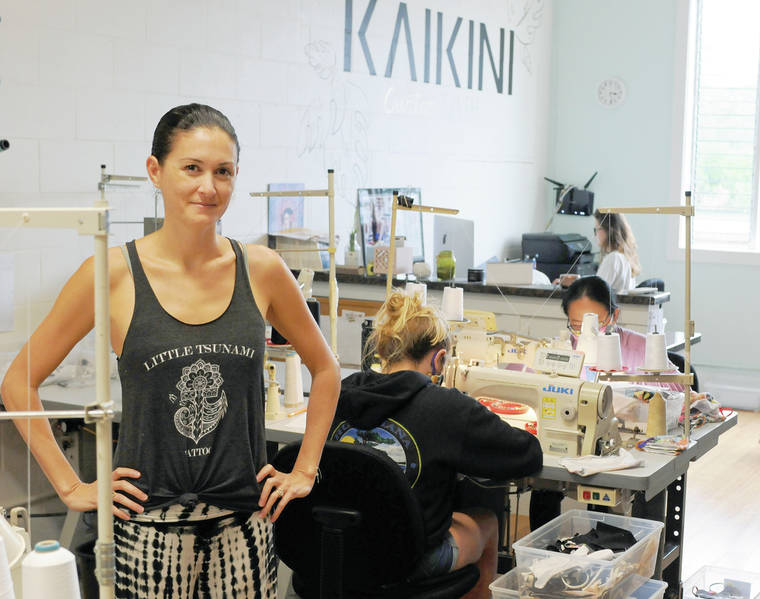Detroit has Ford and General motors abruptly halting car production to switch quickly to making ventilators to treat the gravest of COVID-19 patients.
And now Kapaa has Kaikini Bikinis, which has temporarily suspended making custom one- and two-piece swimsuits to churn out the first of a minimum of 1,500 cloth masks that can be worn in public (though not in a sterile setting) to avoid spreading the disease.
Taryn Rodighiero, founder and CEO of Kaikini, said she decided a week ago to halt all bikini production and churn out nothing but masks for two weeks. When that’s finished, limited swimsuit manufacture will resume, but the five-employee operation will continue making masks until the pandemic has abated.
The mask is a tightly woven cotton fabric, lined with flannel. It’s a one size fits all item, with elastic straps that go behind the ears.
The initial production run is in a Hawaiian floral print. As it happens, Rodighiero originally acquired the material five years ago, but found it would not work for swimsuits as well as she had hoped.
But the fabric was not returnable, so it had sat in storage at Kaikini’s factory, on the second floor of a nondescript industrial building in the middle of Kapaa. It turned out, she said, that the material is perfect for COVID-19 masks, which she said were designed based on extensive research
The first masks, Rodighiero said, will be donated to hospitals whose staff members need a protective mask they can wear when they are off duty. People who work in the field can fill out a form on Kaikini’s website (www.kaikini.com) and request however many masks they need. Kaikini is also accepting donations to offset the cost of production.
Product that is not needed to fill the needs of health care workers will be sold online to the public. Masks will cost $10 to $15 each.
“We started out when we realized we had some extra fabric,” she said. “Of course, we have elastic and as the COVID-19 pandemic kept going, we saw the need for masks kept increasing.”
So when Rodighiero’s seamstresses reported for work last Monday, she had some news for them. Swimsuits were on hold and Kaikini would shift entirely to masks, running two sewing shifts per day until they can turn out at least an initial run of 1,500.
“We have put a pause on swimwear and are 100 percent dedicated to making masks, so we’re trying to get as many out as possible,” she said. The two shift system will run seven days a week. She said she’s hired a couple of additional people and got a line on additional sewing machine to supplement the five she already operates.
Product care instructions will suggest that the user wash the mask before wearing it the first time and after each use after that. Masks should be washed in cold water with mild soap, in a lingerie bag, if possible. They can be line dried or put in a dryer on low heat.
Limited swimsuit production will have to resume after the initial two-week mask production rush ends, to fill orders that came in before the switchover began. The masks will be available online only. Kaikini sells 85 to 90 percent of its swimsuits custom made, online. Some premade suits are also sold at three retail outlets on Kauai and one on Oahu.
For a fully customized swimsuit, the customer enters her under-bust measurement or bra size, mid-torso measurement, and measures of waist and hips in an online form.
The masks, she said, are extremely simple to make, unlike bikinis—especially tops—that involve multiple types of stitching where very little of the sewing is straight. Some of the suits are reversible—an extra challenge for the people who sew them, she said. For the masks, she said, “about all you need to be able to do is sew in a straight line.”
On the other hand, she said, “sewing swimwear is very technical, with lots of little tiny details.”
Rodighiero said she got her start about 10 years ago and decided to open the swimwear business even though she’d never as much as sewn on a button in her entire life. “I had never picked up a needle and thread, but I was going to produce swimwear on a production basis,” she said.
The business started out in her spare bedroom “because I was obsessed with bikinis but felt I could improve on them. I wanted to make things that would last forever, or at least as long as possible. I was frustrated with what was out there in the marketplace.” At one point, she said, she had personally acquired about 200 bikinis, which she poured over to glean details of how they were made.
As things have turned out, Rodighiero has five full-time employees, two of whom have been with her since Kaikini started.
Of the detour she’s made into COVID-19 masks, she said, “We’re all in this together and it’s gonna be over.”


